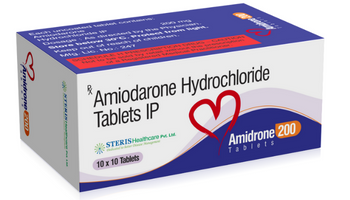Amiodarone Hydrochloride Tablets
Feb 16, 2023
Amiodarone Hydrochloride
Amiodarone 200
AMIDRONE 200 is a widely used prescription medication that contains Amiodarone Hydrochloride as its active ingredient. It is primarily prescribed for the treatment and prevention of various types of serious, life-threatening ventricular and supraventricular arrhythmias. This drug plays a critical role in managing irregular heartbeats, particularly when other medications have proven ineffective or are not well tolerated.
This article provides an in-depth look at AMIDRONE 200, including its composition, indications, usage guidelines, dosage recommendations, possible side effects, and an overall conclusion for patients and healthcare providers.
Composition of AMIDRONE 200
Each tablet of AMIDRONE 200 contains:
-
Active Ingredient:
Amiodarone Hydrochloride – 200 mg -
Excipients:
May include lactose, maize starch, magnesium stearate, povidone, and colloidal silicon dioxide (varies slightly by manufacturer).
Amiodarone belongs to the class III antiarrhythmic drugs. It works primarily by prolonging the repolarization phase of the cardiac action potential, thereby stabilizing the heart rhythm.
Uses and Indications
AMIDRONE 200 is indicated for patients with:
-
Ventricular Tachycardia (VT): Rapid heartbeat originating from the lower chambers of the heart.
-
Ventricular Fibrillation (VF): A life-threatening arrhythmia with rapid, irregular electrical impulses.
-
Supraventricular Tachycardias (SVT): Abnormal rhythms starting above the ventricles.
-
Atrial Fibrillation (AF): Especially when rate or rhythm control is not achieved with other medications.
-
Wolff-Parkinson-White (WPW) Syndrome: A rare congenital condition causing abnormal conduction pathways.
Note: AMIDRONE is typically used only when other treatment options have failed or are contraindicated due to its potential for serious side effects.
Dosage and Administration
Initial Loading Dose:
-
The starting dose is often 800 to 1,200 mg daily (in divided doses) for 1 to 2 weeks under strict medical supervision to achieve adequate tissue saturation.
Maintenance Dose:
-
After achieving rhythm control, the dose is typically reduced to 200 to 400 mg per day, depending on individual response and tolerance.
Route of Administration:
-
Oral tablets should be swallowed whole with water, preferably at the same time each day, with or without food.
Monitoring:
Due to its narrow therapeutic index and potential toxicity, patients should undergo:
-
Regular ECG monitoring
-
Liver function tests
-
Thyroid function tests
-
Pulmonary assessments
-
Ophthalmologic exams
Side Effects of AMIDRONE 200
Despite its efficacy, AMIDRONE 200 is associated with numerous potential side effects, some of which can be severe or life-threatening. The most commonly reported include:
1. Pulmonary Toxicity:
-
Interstitial pneumonitis and pulmonary fibrosis are serious complications.
-
Symptoms: persistent cough, difficulty breathing, chest pain.
2. Thyroid Dysfunction:
-
Hypothyroidism or Hyperthyroidism due to the high iodine content.
-
Regular TSH monitoring is essential.
3. Hepatotoxicity:
-
Elevated liver enzymes and rare cases of liver failure.
-
Liver function tests are recommended during treatment.
4. Cardiac Effects:
-
Bradycardia (slow heart rate), QT prolongation, or worsening arrhythmia.
-
ECG monitoring is crucial.
5. Ocular Issues:
-
Corneal microdeposits (usually harmless), optic neuropathy or neuritis (rare but serious).
6. Dermatological Effects:
-
Photosensitivity (avoid direct sunlight), skin discoloration (bluish-grey pigmentation).
7. Neurological Effects:
-
Tremors, sleep disturbances, peripheral neuropathy, dizziness.
8. Gastrointestinal Distress:
-
Nausea, constipation, loss of appetite, or taste disturbances.
Precautions and Contraindications
Contraindicated In:
-
Patients with severe sinus-node dysfunction, second- or third-degree AV block (without pacemaker)
-
Known hypersensitivity to iodine or amiodarone
-
Pregnant or breastfeeding women (unless absolutely necessary)
Drug Interactions:
-
May interact with warfarin, digoxin, beta-blockers, calcium channel blockers, statins, and phenytoin
-
Grapefruit juice should be avoided, as it can increase amiodarone levels
Patient Counseling Points
-
Do not discontinue abruptly without consulting a doctor.
-
Use sunscreen and protective clothing to avoid sunburn.
-
Report any new symptoms such as vision changes, breathing problems, or fatigue.
-
Adhere strictly to follow-up schedules for monitoring blood and organ function.
Conclusion
AMIDRONE 200 (Amiodarone Hydrochloride) is a potent and effective antiarrhythmic medication used to manage serious cardiac arrhythmias that are unresponsive to other treatments. Its broad-spectrum antiarrhythmic effects make it invaluable in clinical settings, especially for life-threatening ventricular arrhythmias.
Recent Post

Isosorbide Mononitrate 60 mg in Long-Term Angina Management: Role and Best Practices Steris Healthcare.

How Ribavirin Capsules Help in Treating Chronic Viral Infections Steris Healthcare.

Mefenamic Acid With Paracetamol Suspension Effective Relief for Pain and Fever in Kids Steris Healthcare.

Levosalbutamol and Ipratropium Bromide Respirator Solution Quick Relief for Wheezing & Tight Airways Steris Healthcare.

Levosalbutamol Respiratory Solution 0.31 mg Trusted Relief for Breathing Problems Steris Healthcare.

Sumatriptan Naproxen Tablets View Uses, Benefits, Dosage, Side Effects Steris Healthcare.

Megestrol Acetate 160 mg tablet: uses, dosage, side effects,

Telmisartan and Hydrochlorothiazide Tablet, Uses, Dosage, Benefits

Clopidogrel 75 mg and Aspirin 150 mg uses, dosage, side effects and more

Amiodarone Hydrochloride Tablet uses, Dosage, Side Effects, precautions and more

